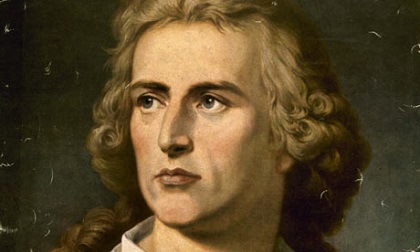 Friedrich Schiller (November 10, 1759 – May 9, 1805), later ennobled to Friedrich von Schiller by the Duke of Wurttemberg, is one of the most famous German philosophers, playwrights and poets.
Friedrich Schiller (November 10, 1759 – May 9, 1805), later ennobled to Friedrich von Schiller by the Duke of Wurttemberg, is one of the most famous German philosophers, playwrights and poets.
Although he was born and grew up in Wurttemberg, the peak of his power happened while he was living in Weimar. The destiny joined two geniuses of the German 18th century culture together in 1799 when he moved to Weimar and met Goethe. Together they founded the Court Theater where Schiller was appointed playwright and stage director upon Goethe’s recommendation.
Although Schiller was known by the works written in different genres – poems, letters, essays, plays, treatises – all his works are inspired by his desire to find harmonic balance between human soul and behavior, human being and his inner world, person and universe. The main focus of his findings was beauty and freedom. The concepts of ‘what is beautiful’ and ‘how to be free’ penetrate all his works. Schiller based his ideas on the earlier philosophers such as Rousseau and Kant, however, his works were original and developed the former fundamentals of the idea of human freedom.
The originality of the idea of unification of human soul and deeds by means of beauty attracted the world of art and German culture of the 18th century, especially the world of music. Brahms, Beethoven and Verdi applied to Schiller’s plays (Nanie) and poems (Ode to Joy) to get inspired for creation of operas and symphonies.
Besides later German philosophers Schiller greatly influenced Nietzsche’s conceptions of human freedom and harmony: to be equal to the God one must develop himself through the feeling of beauty and study of superman deeds and soul. Schiller’s strive to overall harmony met religious concepts of forgiveness, sympathy, truth and love. To feel the beauty one must study. Schiller saw education and learning ethical and aesthetic principles as the key way to gain feeling of beauty. Knowledge gives you freedom:
Thy magic powers re-unite
What custom’s sword has divided
Beggars become Princes’ brothers
Where thy gentle wing abides.
You bow down, millions?
Can you sense the Creator, world?
Seek him above the starry canopy. (Ode to Joy)
and shows the way to beauty and God:
Gods one cannot ever repay,
It is beautiful, though, to be like them.
Sorrow and Poverty, come forth
And rejoice with the Joyful ones.
Anger and revenge be forgotten,
Not one tear shall he shed anymore,
No feeling of remorse shall pain him.
He whom star clusters adore,
He whom the Seraphs’ hymn praises,
This glass to him, the good spirit,
Above the starry canopy! (Ode to Joy).
Related Articles:
Famous Germans: Icons Who Shaped the World
German Literature: From the Brothers Grimm to Contemporary Authors
E.T.A. Hoffman
Bertolt Brecht
Johann Wolfgang von Goethe
Grimms’ Brothers Fairy Tales
Heinrich Theodor Böll







